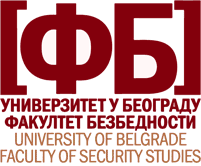An Ethical Review of Euthanasia and Physician-assisted Suicide
Само за регистроване кориснике
2017
Чланак у часопису (Објављена верзија)

Метаподаци
Приказ свих података о документуАпстракт
Background: In the majority of countries, active direct euthanasia is a forbidden way of the deprivation of the patients' life, while its passive form is commonly accepted. This distinction between active and passive euthanasia has no justification, viewed through the prism of morality and ethics. Therefore, we focused on attention on the moral and ethical implications of the aforementioned medical procedures. Methods: Data were obtained from the Clinical Hospital Center in Kragujevac, collected during the first half of the 2015. The research included 88 physicians: 57 male physicians (representing 77% of the sample) and 31 female physicians (23% of the sample). Due to the nature, subject and hypothesis of the research, the authors used descriptive method and the method of the theoretical content analysis. Results: A slight majority of the physicians (56, 8%) believe that active euthanasia is ethically unacceptable, while 43, 2% is for another solution (35, 2% took a viewpoint that it ...is completely ethically acceptable, while the remaining 8% considered it ethically acceptable in certain cases). From the other side, 56, 8% of respondents answered negatively on the ethical acceptability of the physician-assisted suicide, while 33% of them opted for a completely ethic viewpoint of this procedure. Out of the remaining 10, 2% opted for the ethical acceptability in certain cases. Conclusion: Physicians in Serbia are divided on this issue, but a group that considers active euthanasia and physician-assisted suicide as ethically unacceptable is a bit more numerous.
Кључне речи:
Active euthanasia / Passive euthanasia / Physician-assisted suicide / Ethics / MoralityИзвор:
Iranian Journal of Public Health, 2017, 46, 2, 173-179Издавач:
- Iranian Scientific Society Medical Entomology, Tehran
Финансирање / пројекти:
- Faculty of Law, University of Kragujevac
Колекције
Институција/група
FBTY - JOUR AU - Banović, Božidar AU - Turanjanin, Veljko AU - Miloradović, Anđela PY - 2017 UR - https://rhinosec.fb.bg.ac.rs/handle/123456789/369 AB - Background: In the majority of countries, active direct euthanasia is a forbidden way of the deprivation of the patients' life, while its passive form is commonly accepted. This distinction between active and passive euthanasia has no justification, viewed through the prism of morality and ethics. Therefore, we focused on attention on the moral and ethical implications of the aforementioned medical procedures. Methods: Data were obtained from the Clinical Hospital Center in Kragujevac, collected during the first half of the 2015. The research included 88 physicians: 57 male physicians (representing 77% of the sample) and 31 female physicians (23% of the sample). Due to the nature, subject and hypothesis of the research, the authors used descriptive method and the method of the theoretical content analysis. Results: A slight majority of the physicians (56, 8%) believe that active euthanasia is ethically unacceptable, while 43, 2% is for another solution (35, 2% took a viewpoint that it is completely ethically acceptable, while the remaining 8% considered it ethically acceptable in certain cases). From the other side, 56, 8% of respondents answered negatively on the ethical acceptability of the physician-assisted suicide, while 33% of them opted for a completely ethic viewpoint of this procedure. Out of the remaining 10, 2% opted for the ethical acceptability in certain cases. Conclusion: Physicians in Serbia are divided on this issue, but a group that considers active euthanasia and physician-assisted suicide as ethically unacceptable is a bit more numerous. PB - Iranian Scientific Society Medical Entomology, Tehran T2 - Iranian Journal of Public Health T1 - An Ethical Review of Euthanasia and Physician-assisted Suicide VL - 46 IS - 2 SP - 173 EP - 179 ER -
@article{
author = "Banović, Božidar and Turanjanin, Veljko and Miloradović, Anđela",
year = "2017",
abstract = "Background: In the majority of countries, active direct euthanasia is a forbidden way of the deprivation of the patients' life, while its passive form is commonly accepted. This distinction between active and passive euthanasia has no justification, viewed through the prism of morality and ethics. Therefore, we focused on attention on the moral and ethical implications of the aforementioned medical procedures. Methods: Data were obtained from the Clinical Hospital Center in Kragujevac, collected during the first half of the 2015. The research included 88 physicians: 57 male physicians (representing 77% of the sample) and 31 female physicians (23% of the sample). Due to the nature, subject and hypothesis of the research, the authors used descriptive method and the method of the theoretical content analysis. Results: A slight majority of the physicians (56, 8%) believe that active euthanasia is ethically unacceptable, while 43, 2% is for another solution (35, 2% took a viewpoint that it is completely ethically acceptable, while the remaining 8% considered it ethically acceptable in certain cases). From the other side, 56, 8% of respondents answered negatively on the ethical acceptability of the physician-assisted suicide, while 33% of them opted for a completely ethic viewpoint of this procedure. Out of the remaining 10, 2% opted for the ethical acceptability in certain cases. Conclusion: Physicians in Serbia are divided on this issue, but a group that considers active euthanasia and physician-assisted suicide as ethically unacceptable is a bit more numerous.",
publisher = "Iranian Scientific Society Medical Entomology, Tehran",
journal = "Iranian Journal of Public Health",
title = "An Ethical Review of Euthanasia and Physician-assisted Suicide",
volume = "46",
number = "2",
pages = "173-179"
}
Banović, B., Turanjanin, V.,& Miloradović, A.. (2017). An Ethical Review of Euthanasia and Physician-assisted Suicide. in Iranian Journal of Public Health Iranian Scientific Society Medical Entomology, Tehran., 46(2), 173-179.
Banović B, Turanjanin V, Miloradović A. An Ethical Review of Euthanasia and Physician-assisted Suicide. in Iranian Journal of Public Health. 2017;46(2):173-179..
Banović, Božidar, Turanjanin, Veljko, Miloradović, Anđela, "An Ethical Review of Euthanasia and Physician-assisted Suicide" in Iranian Journal of Public Health, 46, no. 2 (2017):173-179.
